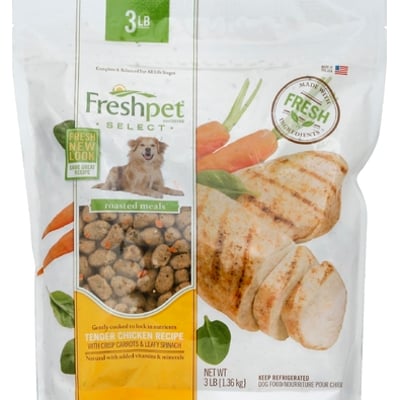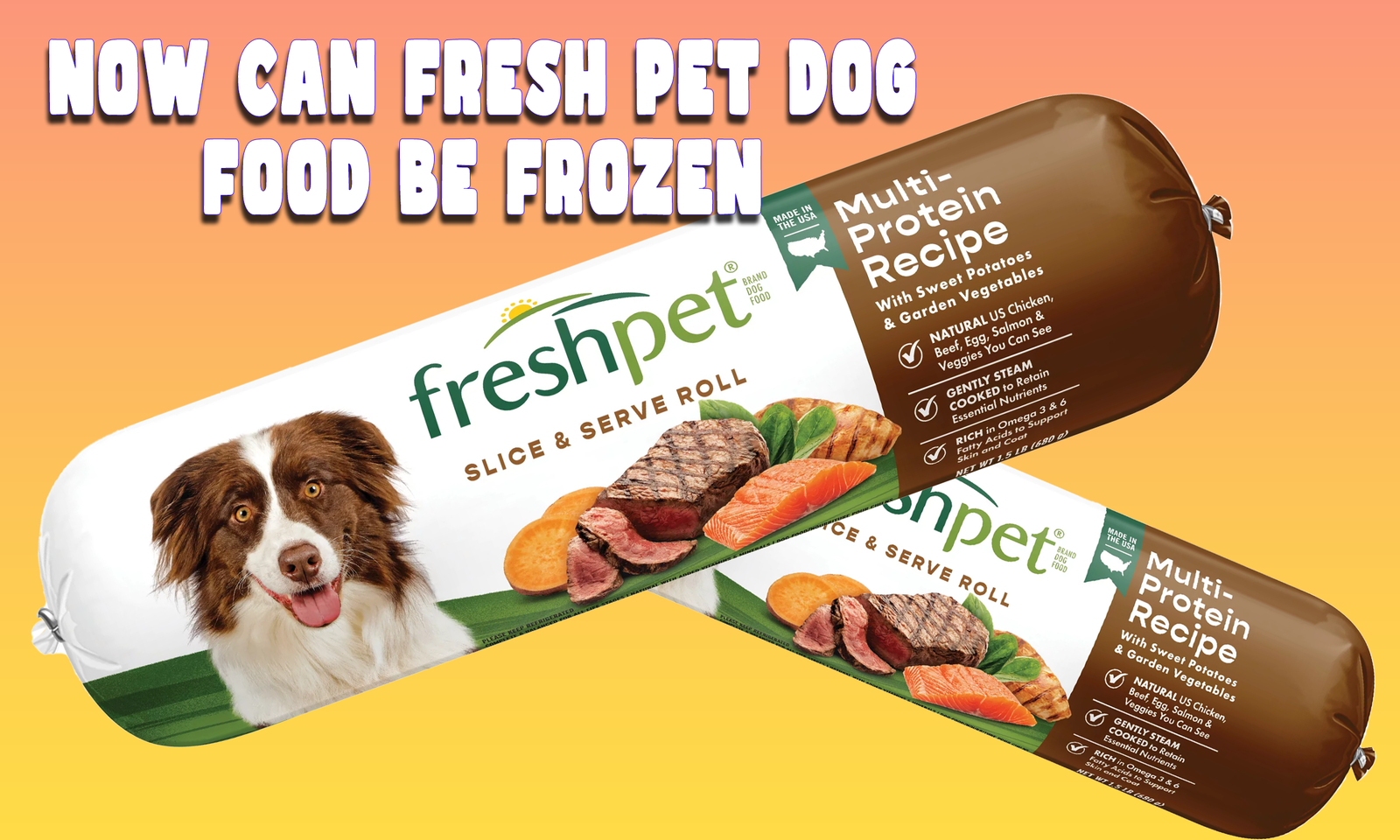Yes, fresh pet dog food can be frozen if done correctly. This can be a convenient option for pet owners who prefer to buy in bulk or have leftovers they don’t want to waste. Follow more about Can Fresh Pet Dog Food Be Frozen.
However, knowing how to freeze and thaw fresh pet food properly is essential to ensure it’s safe for your furry friend to eat. Some tips to remember include dividing the food into portions before freezing, storing it in airtight containers or bags, and thawing it in the refrigerator before serving.

It’s also important to check the ingredients and packaging instructions to ensure the food is suitable for freezing. Following these guidelines, pet owners can safely freeze and thaw fresh pet dog food without compromising quality or safety.
Credit: www.heb.com
Can Fresh Pet Dog Food Be Frozen?
As pet owners, we always want to ensure our furry friends receive the best nutrition to keep them healthy and happy. One common question dog owners ask is whether fresh pet dog food can be frozen.
Factors To Consider Before Freezing Fresh Pet Dog Food
Freezing fresh pet dog food can be a convenient and cost-effective way to store your pet’s meals, especially for busy pet owners or those who prefer to prepare their dog’s meals in advance. However, before freezing your fresh pet dog food, there are some essential factors to consider:
| Factor | Description |
| Ingredients | Check the label to ensure that the ingredients are suitable for freezing. |
| Container | Use a container suitable for freezing dog food, such as an airtight or freezer-safe bag. |
| Portion Size | Freeze the dog food in appropriate portion sizes to avoid waste and ensure that the food is easy to thaw. |
| Duration | Freeze the dog food for a suitable duration to avoid freezer burns and spoilage. |
Best Practices For Freezing Fresh Pet Dog Food
To ensure the freshness and nutrition of your pet’s food, there are some best practices to follow when freezing fresh pet dog food:
- Cool Down: Let the freshly prepared pet dog food cool down before storing it in the freezer. This helps avoid excess moisture and breeding bacteria in the freezer.
- Label the Container: Label the container with the date of preparation to help you keep track of the duration and freshness of the frozen pet dog food.
- Use the Right Container: Use a freezer-safe container or bag big enough for the food to expand as it freezes.
- Portion Control: Freeze the pet dog food in individual meal portions to avoid waste and make it easier to thaw.
- Storage Duration: Store the frozen pet dog food for a suitable duration of not more than 6 months. Beyond six months, the quality and nutrition of the dog food may deteriorate.
- Thawing: Thaw the pet dog food in the fridge or microwave, avoiding room temperature thawing that can breed bacteria. For best results, thaw the frozen food overnight in the refrigerator.
In conclusion, fresh pet dog food can be frozen to maintain nutrition and freshness. However, proper preparation, storage, and thawing practices should be followed. Always check the label for freezing suitability and store the food appropriately to ensure your furry friend gets optimum nutrition.

Credit: shop-prepared.savemart.com
How much Fresh pet roll to feed the Dog

Determining the appropriate amount of Freshpet roll to feed your dog depends on several factors, including size, age, activity level, and any specific dietary needs or restrictions. As a general guideline, it’s recommended to feed approximately 1 ounce of Freshpet roll per pound of your dog’s body weight daily.
However, this can vary, so it’s essential to consult with your veterinarian to establish a tailored feeding plan for your furry companion. Observe your dog’s body condition and adjust the portion size to maintain a healthy weight.
Always provide fresh water and monitor your dog’s overall health and well-being while incorporating the Freshpet roll into its diet.
Freshpet Killed My Dog
“Freshpet Killed My Dog” is a heartbreaking phrase that encapsulates the anguish of pet owners who have lost their beloved companions after feeding them Freshpet products.
Despite the company’s claims of providing nutritious and wholesome meals, countless pet owners have shared harrowing accounts of their pets falling ill or dying after consuming Freshpet food. These incidents have sparked outrage and led to investigations into the safety and quality of Freshpet’s products.
For those who have experienced the loss of their furry friends, the pain is immeasurable, compounded by the realization that a product meant to nourish and sustain their pets may have ultimately led to their demise.
The grief and anger of these pet owners serve as a stark warning to others, urging caution and thorough research when selecting food for their cherished companions. The haunting echo of “Freshpet Killed My Dog” serves as a poignant reminder of the devastating consequences that can arise when trust is misplaced in the pet food industry.
How much Freshpet roll to feed the dog
Determining how much Freshpet roll to feed your dog can be an intricate balancing act considering numerous variables like weight, age, activity levels, and overall health. Freshpet roll’s natural ingredients come together with printed instructions for feeding on its packaging – typically serving an initial daily amount based on weight; for dogs who weigh approximately 25 pounds, it usually amounts to 1 pound Freshpet roll, but individual needs may differ significantly from this average figure.
Young puppies of larger breeds require greater caloric and nutritional needs due to their larger body mass and energy expenditure, thus necessitating additional food according to body weight in comparison with adult-age dogs; older dogs who may require less food because their metabolism slows may only require minimal amounts to reach ideal weight – therefore monitoring weight as well as altering amount consumed are crucial to guarantee that no overfeeding or underfeeding occurs.
Activity levels also play a vital role. Dogs that work or take part in rigorous workouts require additional calories to sustain performance levels; in contrast, more relaxed pets with minimal physical exertion typically need less food to prevent overweight acquisition and its related health problems. Freshpet rolls make feeding your pet easy – break off small portions for customized results!
Other health concerns can impact how much food should be fed to an animal. Pets suffering from medical conditions like diabetes, hypothyroidism, or heart diseases may require unique feeding plans; in such an instance, consulting with a veterinarian is vital to establish appropriate quantities and monitor health indicators frequently; also, an experienced vet will have valuable advice as regards whether regular feeding regimens need adjusting in light of specific medical issues that affect an animal’s wellbeing.
Changes in seasons can also impact a dog’s diet. Winter months often call for increased food consumption to maintain body temperature stability and energy levels; conversely, in summer, when expenditure declines, less food could be required as energy demands decrease.
Food schedules can also play an integral part in digestion. By offering multiple meals per day, this practice could aid with digestive health and help avoid issues with constipation and weight gain. Incorporating it into daily practice might give active breeds even more energy throughout their daily activities!
Freshpet rolls offer a practical starting point when deciding how much food to give dogs; however, the actual feeding amount depends upon factors like weight, age, activity level, state of health, and season. Stay aware of your dog’s situation by consulting a vet as necessary and making changes accordingly to provide sufficient nutrition that supports the well-being and health of your animal. Also, they should keep a close eye on their bodies; making minor modifications could benefit their weight reduction and overall wellness.
Do vets recommend Freshpet dog food?
Veterinarians are invaluable in guiding pet parents when selecting animal food options. Freshpet’s pet food often makes its way onto discussion lists during consultations with veterinarians. While not all veterinarians endorse Freshpet expressly, most are well aware of its many advantages for premium, low-processed foods; the opinions about Freshpet depend on who is providing consultation and which health requirements the dog being examined has.
Veterinarians frequently recommend Freshpet pet food because of its emphasis on natural, fresh ingredients. Many Freshpet items feature fresh meats, veggies, and grains – more closely matching up with an animal’s traditional diet as opposed to heavily processed kibble products – making Freshpet an excellent solution for canines with sensitivities or digestion issues or allergies since its absence of artificial fillers, preservatives or ingredients tends to result in less adverse reactions than processed brands such as commercial canned or dry dog foods. A vet might recommend Freshpet when commercial canned or dry dog foods are no longer sufficient due to negative interactions with manufacturers’ kibble products like commercial canned/dry items being an issue; therefore, veterinarians might suggest Freshpet instead for dogs having difficulty when struggling to transition off of commercial canned or dry items when switching over.
Nutrition plays an integral part in a dog’s overall well-being. Freshpet’s commitment to fresh ingredients often makes the nutrients bioavailable – easier for pets to digest and use – than traditional pet food brands like Pedigree. Veterinarians aware of its significance may recommend it specifically for dogs with a higher protein diet that requires fresh. Furthermore, its cold pasteurization process with minimal heating helps preserve nutritional integrity – consistent with holistic vet guidelines that support eating balanced meals as a foundation for maintaining and preventing health.
Veterinarians may recommend Freshpet due to its moist material. Freshpet dog food typically offers higher moisture levels than dry kibble, making this food especially helpful to dogs who do not get sufficient fluid intake, helping maintain proper hydration levels and supporting kidney health. Freshpet can significantly assist those struggling with urinary tract problems or dehydration who could benefit from diets including moisturizing foods like Freshpet.
At Freshpet, it is essential to remember that not all veterinarians advocate its use indiscriminately. Some pet owners might express reservations over price (premium fresh pet food can often cost more than standard dry food) or have questions regarding shelf-life and storage needs: fresh requires refrigeration but will last much longer when compared to dry food products; plus, every animal is different; what works for one animal might not suit another due to other health concerns, diet requirements, and preferences.
Veterinarians make decisions regarding Freshpet dog food depending on some variables, including its specific requirements for health, the lifestyle of its owners, and the overall policies of veterinarians. Therefore, pet owners need to have open conversations with their veterinarian about both its advantages and any possible drawbacks relative to the specific circumstances of their own pets’ situation – this enables informed choices that ensure the well-being and health of both parties involved, taking into account of nutritional advantages such as Freshpet as well as individual requirements of each pet.
Frequently Asked Questions Of Can Fresh Pet Dog Food Be Frozen
Can You Freeze Freshpet Brand Dog Food?
Yes, you can freeze Freshpet brand dog food. For best quality, freeze the food within 2 days of opening it. Freeze the food in an airtight container and thaw it in the refrigerator before serving it to your dog.
How Long Does Fresh Dog Food Last In The Freezer?
Fresh dog food can last up to six months in the freezer. Store it in an airtight container or bag labeled with the freezing date. Thaw in refrigeration before serving and discard any leftovers after five days.
How much time does fresh pet food keep in the refrigerator?
Freshpet dog food can last up to 6 days in the fridge after opening. Once opened, seal it tightly and keep it refrigerated to maintain its freshness. Discard unused portions after 6 days to keep your furry friend safe and healthy.
What Is The Shelf Life Of Fresh Dog Food?
The shelf life of fresh dog food varies depending on the ingredients, preparation, and storage method. Generally, it can last up to 4-5 days in the fridge and 2-3 months in the freezer. Following storage guidelines and use-by dates is essential to ensure your dog’s safety and health.
Conclusion
Before freezing fresh pet dog food, consider its quality and nutritional value. While freezing can help preserve the food’s freshness for future use, it’s best to consult your vet or the brand’s manufacturer for their recommendation.
Ultimately, it all comes down to the type of ingredients and storage process. Never forget that a balanced diet is the foundation for a happy and healthy puppy.

I’m a Canada, UAE, US, and UK-based writer and dog expert blogger. I spent over five years learning about dog food and grooming techniques. Additionally, I recommend avoiding and properly treating various physical problems in dogs. I am here to share my knowledge about good dog nutrition and care.

